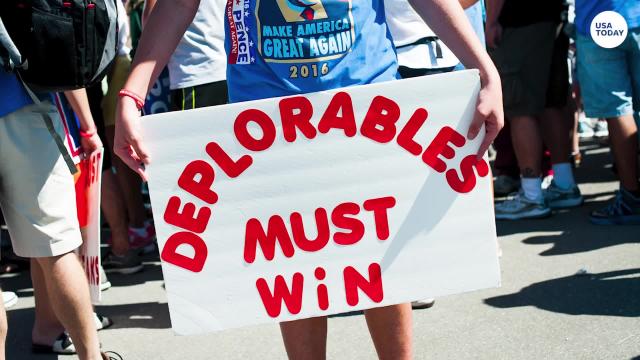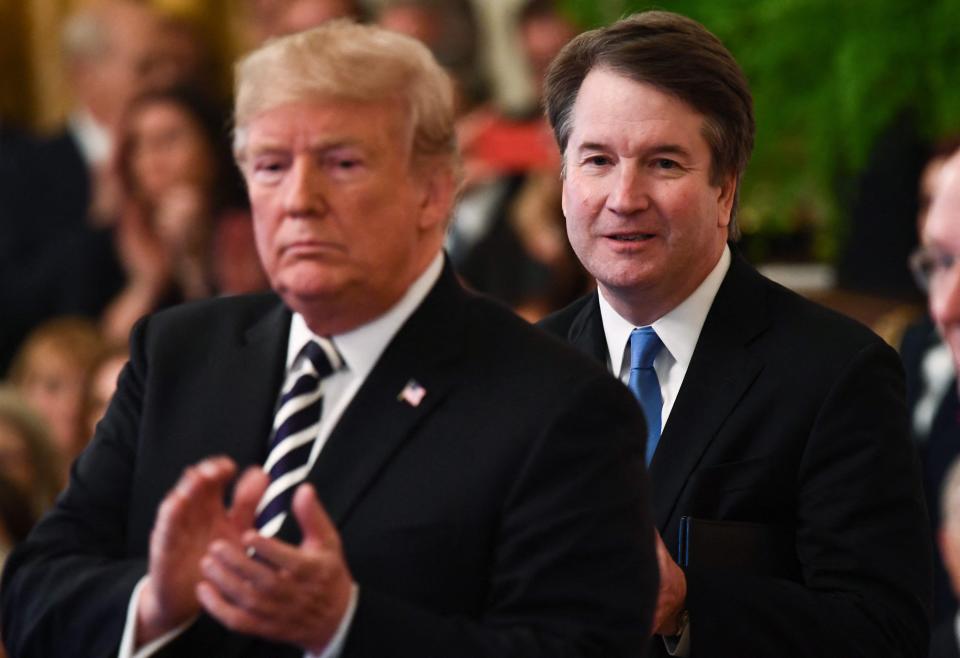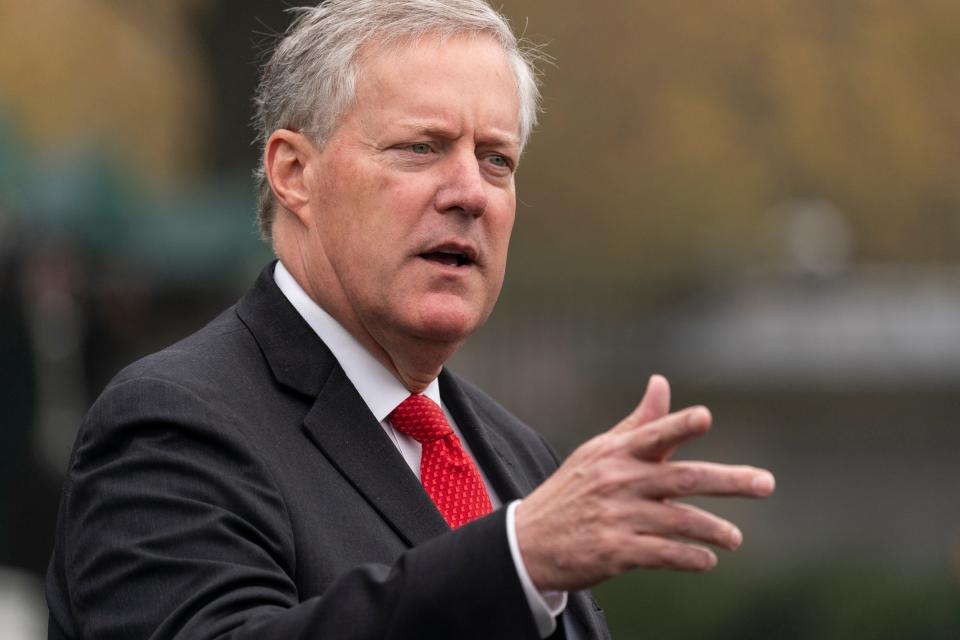Supreme Court, mired in controversy, could wade into Trump indictments. Here's how it could happen.

WASHINGTON – If history is any guide, former President Donald Trump could be holding out for help from the Supreme Court ? even if history also suggests he won't get it.
As Trump and his allies face a 41-count indictment in Georgia for their role in attempting to overturn the 2020 election, there is a chance the former president will call on the high court to weigh in on a variety of questions in the sprawling case, experts said, as well as in the other criminal matters in New York, Florida and Washington, D.C.
Though the final outcome of those cases are unlikely to be appealed to the Supreme Court, the justices may be asked to decide whether two of the cases should be moved to federal court, whether Trump and other former federal officials are entitled to immunity, and even whether efforts to limit Trump's public remarks about his legal problems on the 2024 campaign trail are consistent with the First Amendment.
"SCOTUS ain't getting off easy here," predicted Josh Blackman, a professor at South Texas College of Law Houston.
Delay: Here's how Donald Trump will try to push back his criminals trials
Those appeals would arrive at a time when the Supreme Court remains under scrutiny for decisions on abortion, affirmative action, LGBTQ+ rights and other questions that divide Americans. At the same time, the high court is keen to avoid the appearance of engaging in politics and has repeatedly shot down other appeals from Trump.
But whether those efforts are ultimately successful may be beside the point: The former president has a long history with long-shot appeals as part of a strategy of delay. Here is a look at some of the issues that could be appealed:

See you in federal court? Trump expected to seek federal review
The former president is widely expected to ask a federal court to take over the Georgia case, largely because many believe his lawyers could build a more conservative jury that way. President Joe Biden won Fulton County with 73% of the vote in 2020.
Trump made the same request in New York, where he faces a 34-count indictment from Manhattan District Attorney Alvin Bragg. A U.S. district judge denied the request last month and the former president appealed to the U.S. Court of Appeals for the 2nd Circuit. That decision, whenever it lands, could be appealed to the Supreme Court.
A filing in federal court this week by Trump’s former chief of staff, Mark Meadows, may serve as the template. Meadows was charged in the Fulton County case for his role in allegedly pressuring Georgia state officials with false claims of election fraud. Meadows is attempting to move his case to federal court ? and have it dismissed.
Federal law allows U.S. officials to move their cases to federal court if they are fighting state charges over actions related to their work for the federal government. The theory dates back centuries and is intended to prevent states from trying to hamstring the federal government by arresting its employees. Trump might argue, for instance, that his effort to overturn the election was made as a president seeking to ensure the sanctity of the vote.
Meadows' filing cites those same grounds in asking a federal court in Georgia to take over his case.

Immunity: Trump could also ask courts to dismiss his case
Meadows raised a related claim in his filing this week that some experts say Trump is likely to attempt: asking a federal court to dismiss the case under the Constitution’s supremacy clause. The theory is that federal officials are immune from state prosecution when they are carrying out their official duties for the U.S. government.
In making such a claim, Trump could rely in part on an 1890 Supreme Court case involving a U.S. Marshal named David Neagle who was assigned to protect Justice Stephen Field while he was hearing cases in California. Neagle shot and killed a man who assaulted the justice over breakfast. California charged Neagle with murder.
But the Supreme Court ruled Neagle "cannot be guilty" of a state crime for an act he was authorized to carry out under federal law.
Trump, like Meadows, may try to convince a court that the actions he took in Georgia were done in his capacity as president. If a lower court rules on that argument, the losing side will likely ask a federal appeals court to review it. That appeals court decision ultimately could be appealed to the Supreme Court.
Summary: Lying, pressuring Georgia officials: What does Trump indictment accuse his associates of doing?
"They're all going to raise it," said Eric Segall, a law professor at Georgia State University. "Trump is going to argue that he and all his merry people were simply ensuring the integrity and fairness of federal elections, something they had an obligation to do, and therefore he has immunity."
Segall said the laws protecting federal officials from state prosecution serve an important purpose. Consider, for instance, federal officials working to desegregate the South during the civil rights era being thrown in jail by state officials opposed to those efforts. But Segall stressed that he doesn’t believe the facts of Trump's intervention will warrant immunity.
"He might win," Segall said, "but he definitely should lose."
Would the conservative Supreme Court back Trump?
As president, Trump placed three justices on the Supreme Court – Neil Gorsuch, Brett Kavanaugh and Amy Coney Barrett – giving it a six-member conservative majority. But in case after case since Trump left office, the court, despite its composition, hasn't had his back.
In November, the court declined Trump's request to block the release of his tax returns to a House committee seeking them. Weeks earlier, it denied his request to allow a special master to review documents seized last year at his Mar-a-Lago estate. It also denied his effort to stop lawmakers from receiving administration documents.
It even started when Trump was still president. In July 2020, the court ruled that Trump could not keep his tax returns and financial records away from New York prosecutors.
Perhaps most notably, the Supreme Court has already dipped a toe into the effort by Fulton County prosecutors. The justices last year denied Sen. Lindsey Graham's request to pause a subpoena from the grand jury. Graham, a South Carolina Republican and Trump ally, argued that his phone calls to Georgia election officials were part of his official duties. Graham had raised a different constitutional defense based on the speech or debate clause, which admonishes that members of Congress "shall not be questioned in any other place" for official remarks.
The court handed down its decision in a brief, unsigned order with no noted dissents. Graham ultimately testified but was not named in the Fulton County indictment.
Political vs. legal strategy: Delay until Election Day
Though the former president and his allies didn’t win those disputes, Trump did manage to delay his losses – sometimes by months. And that stands to be a major part of any appeals strategy.
In the case of Trump's tax returns, for instance, Democrats on the House Committee on Ways and Means sued for the documents in federal court in 2019, when Trump was still president. By the time the case wended its way through the federal court system, he had been out of the White House for nearly two years. The Supreme Court denied Trump's emergency appeal in that case in 2022, and the committee made the documents public in late December.
The Fulton County grand jury had been seeking Graham's testimony as far back as July 2022. By the time the Supreme Court ruled against him, nearly five months had passed. Graham finally appeared a few days before Thanksgiving last year.
The former president, who is running for office again, has already called for all four criminal trials he is facing to be delayed until after the November 2024 election. Trump has long claimed that the criminal prosecutions are politically motivated to undermine his bid for the White House.
Besides the practical benefit of not having to juggle court appearances while running for president, Trump has managed to use his legal problems as a fundraising tool and a rallying cry for supporters.
The maneuvering shouldn't work in the end, Harvard Law professor Laurence Tribe and two other prominent lawyers wrote this week in The Atlantic. But, they said, it "will command our attention, and it will introduce a potential for delay."
Contributing: David Jackson

This article originally appeared on USA TODAY: Will Supreme Court enter Trump indictment fray? Here's how it could happen.